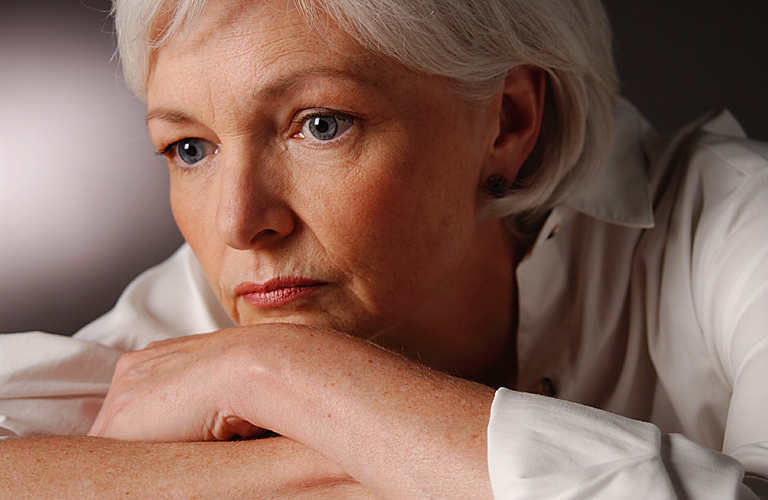Hormonal changes can create imbalances in brain chemicals, leading to anxiety and depression. Discover herbal options that ease tension naturally
 Although hot flashes grab most of the attention when it comes to menopause, anxiety is an equally common symptom among menopausal-age women. And overall, anxiety is twice as common in women as in men. During menopause (as well as the time leading up to it), hormonal changes can set the stage for anxiety.
Although hot flashes grab most of the attention when it comes to menopause, anxiety is an equally common symptom among menopausal-age women. And overall, anxiety is twice as common in women as in men. During menopause (as well as the time leading up to it), hormonal changes can set the stage for anxiety.
The Anti-Anxiety Diet
Two of the most important things you can do to alleviate anxiety is to increase your consumption of plant foods—especially those high in phytoestrogens—and reduce your consumption of animal foods.
Phytoestrogens are plant substances that bind to estrogen receptors in mammals. Soy foods and flax seeds are rich in phytoestrogens, but they’re also found in other legumes, as well as apples, carrots, fennel, celery, and parsley. A diet high in phytoestrogens is thought to explain why menopausal symptoms, including anxiety, appear to occur less frequently in cultures that consume a predominantly plant-based diet. In addition, such a diet is promising for disease prevention, with some research showing a lower incidence of breast cancer and heart disease in women consuming high-phytoestrogen diets.
Increased lactic acid levels may be a factor in many cases of anxiety. There are at least six nutritional factors that may be responsible for elevated lactic acid levels: alcohol, caffeine, sugar, B-vitamin deficiency, calcium or magnesium deficiency, and food allergens. By avoiding alcohol, caffeine, sugar, and food allergens, people with anxiety can go a long way toward relieving symptoms. In fact, something as simple as eliminating coffee can result in complete relief from anxiety symptoms.
It’s also important to note that a full-spectrum, high-quality multivitamin is essential, regardless of how healthy you eat. Take consistently for best results.
Fish Oils
Fish oils high in the omega-3 fatty acids EPA and DHA have shown positive effects for patients with many different types of psychological disorders, including anxiety, depression, bipolar disorder, borderline personality disorder, and attention deficit disorder with hyperactivity (ADHD).
Fish oil trials in menopausal women showed particularly interesting results. In a 2009 study conducted in Quebec, Canada, 120 women going through menopause were given either a fish oil supplement providing 1,200 mg of EPA and DHA or a placebo for two months. The baseline level of hot flashes was an average of 2.8 per day. After 8 weeks, hot flash frequency decreased by 55 percent in the EPA and DHA group, but by only 25 percent in the placebo group.
Botanical Medicines
Black cohosh is the most studied herbal alternative for menopause symptoms. Research indicates that it is most effective for hot flashes, mood swings, sleep disorders, and body aches. It also appears to be helpful in reducing anxiety, as well as symptoms of anxiety such as heart palpitations. Some studies have used black cohosh in combination with St. John’s wort, red clover, soy, and/or chaste tree berry.
Motherwort, a traditional herbal remedy for heart and nerve health, is another option for anxiety, particularly for those whose chief anxiety symptoms include palpitations and a pounding heart.
As most people familiar with herbal medicine know, St. John’s wort is known for its benefits for mild to moderate depression. But scientists have also evaluated its effects on menopausal symptoms. These studies have not only shown that St. John’s wort can improve mood, but that it also reduces hot flashes. In regard to improving mood, the effects were most obvious after 2 months of treatment (at 900 mg per day). Women in the St. John’s wort group reported improvements in psychological symptoms linked to menopause, significantly better quality of life scores, and fewer sleep problems.
Another botanical medicine that can be of great benefit in relieving anxiety during menopause is maca. Research indicates that unlike hormone replacement therapy (HRT), maca helps increase the body’s production of estrogen and lower levels of cortisol. It has been suggested that maca’s therapeutic actions rely on plant sterols stimulating the hypothalamus, pituitary, adrenal, and ovarian glands, and therefore also affecting the thyroid and pineal glands—thus improving sleep, mood, energy, and hot flashes.
In a 4-month study, patients were given a placebo or two 500 mg capsules of maca twice daily (for a total of 2 grams of maca per day). After 2 months, maca stimulated estrogen production, suppressed cortisol, and alleviated menopausal symptoms including hot flashes, insomnia, depression, and nervousness.



